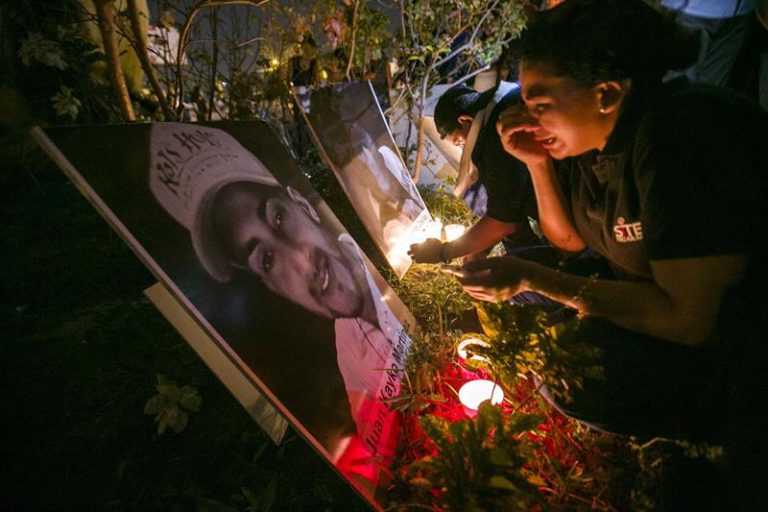13 de junio 2020

News About Sheynnis Palacios Not Covered by Media Operating in Nicaragua

PUBLICIDAD 1M
PUBLICIDAD 4D
PUBLICIDAD 5D
Our struggle will not end when Ortega and Murillo pass on, but when we learn to demand and defend the rights we are entitled to

The repercussions of the protests in United States with the arrest and death of George Floyd are different from those experienced by Nicaragua since 2018
The repercussions of the protests in the United States with the arrest and death of George Floyd at the hands of a police officer in Minneapolis, Minnesota, are different from those experienced by Nicaragua since April 2018, with the death of more than 300 people at the hands of the police and paramilitary forces.
The most obvious are derived from the economic importance of both countries. I do not refer to that. But to other aspects that we Nicaraguans cannot forget: police brutality and the bias of judges.
During these two terrible years since April 2018 until the pandemic we live today, we have been witnesses of police brutality. We saw with horror how they threw young people and those not so young into the cargo bed of the sinister Hi Lux pick up trucks of the police and others that did not belong to said body, but paramilitaries.
We saw these combined forces act in broad daylight and in the shadows of the night, which led the Inter-American Human Rights Commission (IAHRC) to say in its 2018 report: “The IACHR found that the state response was characterized by the repression and criminalization of protesters and the social movement they represent, and which has resulted in serious human rights violations.”
As findings of their report they highlight “the excessive and arbitrary use of police force, the use of paramilitary groups or shock groups with the acquiescence, tolerance and collaboration of state authorities…”
This is not new, Nicaraguan citizens and many foreigners know it. What I want to stress is that while in the United States, the police officer who killed George Floyd was arrested and today faces a judicial process, in Nicaraguan the main torturers and violators of human rights were promoted and occupy high positions. The guard of the Penitentiary System who killed in cold blood political prisoner, Eddy Montes, continues in his post, without sanctions.
Protests in the United States have attained that detention techniques used by officer Chauvin be banned in some states, and moreover, there is discussion about how to put the brakes on, or at least curtail, police brutality. In other states, fundamental reforms to police regulations and budget reductions are being discussed; definitely, they are seeking to put limits to police actions.
In Nicaragua, the police continue to arbitrarily arrest anyone who dare go out into the streets to protest peacefully. It is also one of the few institutions whose budget has increased in 2020, despite the strict control of public spending, that not even the pandemic has managed to modify. If the population continues to die due to the lack of medicines, equipment, beds or the lack of doctors to care for them, because every day we know about new layoffs, that does not change the lesson learned by Ortega to maintain fiscal balance.
In Nicaragua, protesters are arrested and imprisoned, not the police who beat or repress them. We saw with horror the humiliation that Commissioner Dominguez did to the Alonso family of Leon, and we continue to see how this character continues doing his evil deeds. Impunity has become the norm, not the exception.
The judicial system has become an accomplice of the repressors. The fabrication of false charges and accusations does not stop for political prisoners, and we observe how young students detained became, by the actions of Ortega-Murillo’s justice, dangerous drug-traffickers, deserving 12, 15 or more years in prison.
In 2012, FUNIDES in a report on the judicial career highlighted the danger that hung over the country’s institutionality due to the lack of independence of the judges, the subordination to their superiors and the cheating in appointments. Little or no attention was paid to this report and today we suffer with horror that, in this country, justice, far from the equilibrium it should have in its balance, is completely inclined to obey the instructions of the person who made the appointment.
This is a result of what the aforementioned study alerted us already in 2012: “only 2.5% of the 444 judicial officials have been appointed by competition. The rest (97.5%) were directly nominated.” The selection of these officials was made, according to the same report, by “cronyism” or party “ties.”
It should not surprise us then, that the sentence falls on those who protest and not on those who repress. It doesn’t matter how many human rights violations have been denounced and documented, as long as we continue to be governed by a judicial system that only obeys partisan orders. We will not have justice as long as we have judges who do not bother to consult or inquire how events took place, but faithfully obey the instructions received directly from the person who they owe their position to.
Hence the importance of institutional health. Autocratic and authoritarian temptations can exist everywhere, but not everywhere can they be implemented. In the United States, with an independent judicial system, it is more difficult. Mistakes and arbitrariness are made, we have seen and known many, but at least there is the hope for justice. And peaceful protests can accelerate it, as is the case of recent days, when protests contributed to the fact that the policemen who observed unshakably the death of George Floyd were detained.
In Nicaragua, as long as the Ortega-Murillo regime continues to trample on the institutions and subject them to its discretion, we will not have justice and neither can we have guaranteed the right to life that should be a primary obligation of the State.
It is possible that the lessons of what we are seeing in the United States and its differences with Nicaragua, we attribute only to the fact that it is a rich country and we are an impoverished one. Or that racial issues drive those protests. It is true that this is a fundamental element, the hundreds of years of racism persist in the minds of many people, unfortunately. But in our country, the different repercussions of the handling of the protests have another origin.
As citizens we didn’t know how to protect ourselves from the arbitrariness that was brewing little by little and we listened as siren calls to the warning voices that came to us from different trenches.
To those already mentioned, I will add the warnings that retired coronel Irving Davila (RIP) made to us about the modifications to the Military Code. According to Law No. 855, approved on January 30, 2014, when to the task of National Defense was added “National Security,” without clearly specifying what that task would be. Perhaps it would be to provide support to the paramilitaries, as has been widely documented.
And perhaps the most delicate of those modifications to the Military Code, is that the “political management” of the Army passed into the hands of the President of the Republic, with which the institutional subjection of military power to civilian power, through the Ministry of Defense, was transferred to the president. In this way, the obedient and today sanctioned General Aviles is in his third term thanks to Ortega.
Let us trust that these warnings and the confirmation of their dangers, would allow us to reflect on our future as a democratic nation and if something we could get out of these painful experiences is that our struggle will not end when Ortega y Murillo pass on, but when Nicaraguans truly exercise our citizenship and learn how to demand and defend the rights that as human beings assist us.
PUBLICIDAD 3M
PUBLICIDAD 3D